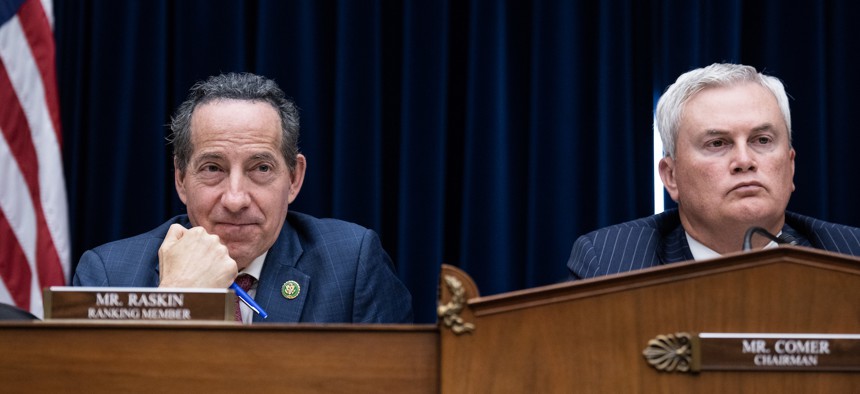House Oversight leaders introduce government AI transparency bill

Reps. Jamie Raskin and James Comer, the ranking member and chairman respectively of the House Oversight Committee, are teaming up on legislation to govern federal AI use cases. Tom Williams/CQ-Roll Call, Inc via Getty Images
This isn’t the first proposal that would require agencies to notify individuals when government decisions are influenced by AI.
The top Democrat and Republican on the House Oversight and Accountability Committee want to beef up transparency requirements around the use of artificial intelligence in federal agencies.
Reps. James Comer, R-Ky., and Jamie Raskin, D-Md. — chair and ranking member of the committee, respectively — introduced the bipartisan Federal AI Governance and Transparency Act on Tuesday along with six other cosponsors.
The bill would set up requirements for agencies to notify individuals when certain government decisions are meaningfully influenced by AI and provide the option for an alternative review process via existing appeals channels.
It would also require agencies to publicly publish governance charters for AI systems deemed high risk or those that interact with records covered by the Privacy Act. Those charters — which would include information like the official responsible for the system and how the system was developed — would be stored in a single Federal AI System Inventory and updated over time.
“We’re introducing the bipartisan Federal AI Governance and Transparency Act to ensure that any federal AI use promotes the fair, just, and impartial treatment of all,” Raskin said in a statement about the bill. “It would also create an oversight framework that will help Congress effectively meet the challenges of this powerful new technology over time.”
The bill also streamlines, consolidates and, in some cases, repeals other laws, the proposal’s backers say, and centrally codifies AI governance requirements and the role of the Office of Management and Budget in establishing guidance for the tech.
“Agencies have already begun to use artificial intelligence,” Comer said in a statement. The proposal “ensures that the federal government’s use of AI will improve government operations while protecting privacy, civil rights and civil liberties, and upholding American values.”
It’s the latest bill introduced by lawmakers looking to react to the rapidly evolving AI landscape.
In the federal government, agencies have over 1,200 current or planned use cases, the Government Accountability Office reported last December.
That same month, Rep. Clay Higgens, R-La., introduced a companion House bill to a Senate-driven bipartisan proposal on AI transparency in government decision-making, called the Transparent Automated Governance Act, or TAG Act. That bill would require certain government decisions — such as those around government benefits — made with automated systems to come with disclosures and options for review by a person.
Federal agencies are also already subject to certain reporting requirements around AI — a 2020 Trump administration executive order included requirements for agencies to inventory their AI uses — but implementation has been plagued by gaps and inaccuracies in said inventories, as GAO noted in its December AI report.
Any congressional proposal that is passed would also interplay with recently released guidance from the Office of Management and Budget on the use of AI within government agencies — guidance that was required under the AI in Government Act of 2020, but delayed in its release until after the Biden administration published its own executive order on AI last fall.
Although not yet finalized, the draft guidance also included a list of requirements for agencies around AI, including notifications and remedy processes for individuals meaningfully impacted by AI-influenced government decisions. Clare Martorana, federal chief information officer, said at a CIO Council event Tuesday that the final guidance would be out this spring.
The new bill will be considered in a committee markup on Thursday.


